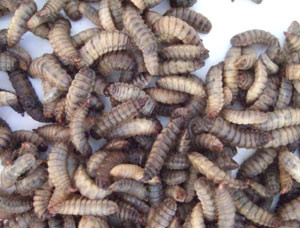
I’m not sure if you’ve heard me talk about it other places on the site, but I raise worms to make my garden grow better. I feed my worms organic fruit and vegetable scraps I get from nearby groceries.
Well, earlier this year I started getting a ton of black soldier fly larvae eating the extra worm food that I put down. For months I’ve been taking the larvae out and putting them in a bin for the birds. Which has been great for the birds and I have counted 18 different species of birds at the house. And that’s amazing because when I moved in 8 months ago there were only pigeons and house sparrows!
Anyway, yesterday I went to write an article about them for my worm website and I Googled them to find out more about them. Well, it turns out that the first page of Google has links to articles about PEOPLE eating black soldier flies.
I couldn’t resist and I clicked on a few of the links. Within an hour I was out in the garden collecting the larvae for dinner. 🙂
And let me tell you, I’m excited about the possibility of actually raising black soldier flies because they are a great source of fat and protein. Those are the two main nutrients my vegetable garden doesn’t give me. It would be amazing to get 80% or more of my food from the garden and eating black soldier flies might make that possible!
I took pictures of the process and you can follow along as I prepare them.
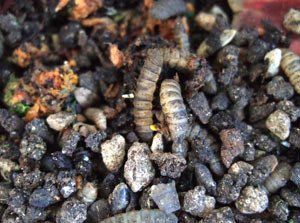
Here are a few black soldier fly larvae in the garden. They eat just about any plant or animal. In my garden they only get the discarded fruits and veggies from the local grocery stores, but there is a video of the larvae eating 2 trout on YouTube that is both fascinating and horrifying.
Even though this is the first time I’ve harvested black soldier flies to eat for myself, I’ve been collecting them for the birds for 8 months. The first thing I do is scoop up a bunch of fly larvae along with some dirt and sift them so the big chucks of worm food get filtered out.
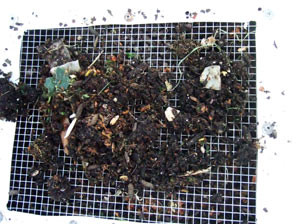
The container below this tub has 1/8 hardware cloth, and most of the black soldier fly larvae can squeeze right through that if I give them 15 or 20 minutes. That makes it easy to separate the bugs from the dirt in the tub above them.
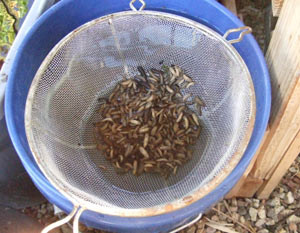
After I separated out the flies, I put them in a strainer and rinsed them. Since they live in my garden soil, they had a lot of dirt on them. I’ve learned that you can raise black soldier fly larvae in sawdust though. If I end up doing that, I won’t have to worry so much about rinsing them.
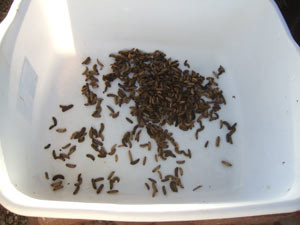
Once I rinsed them off, I dumped them in a white tub while I got things ready in the kitchen. I discovered that they poop a lot. So I left them in the tub longer than I needed to so they’d poop more, then I rinsed them again.
Now it was time to cook them.
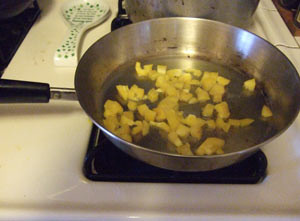
In the kitchen I sauteed some yellow peppers first since I figured they’d need to cook a while.
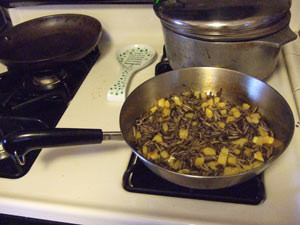
Then I added the worms. It was interesting. They smelled absolutely delicious, kinda nutty. But when they got too hot or cooked too much, I’m not sure which, they started popping like popcorn! You can see one that exploded out of the pan in a later picture.
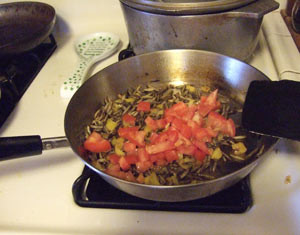
Next I added some tomatoes.
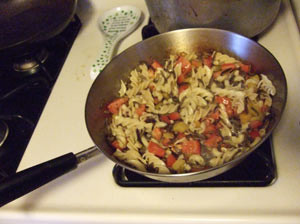
Here’s the finished meal after adding some pre-cooked noodles my roommate had in the fridge and a bit of Cajun spice mix.
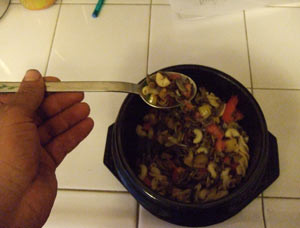
Here’s the finished product in my bowl ready to eat.
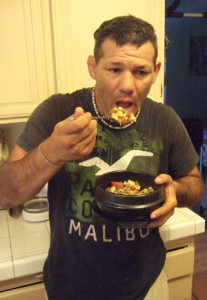
Trying the first spoonful.
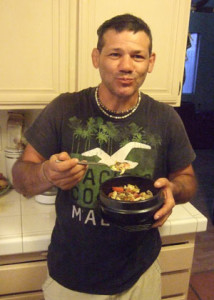
That is amazingly good! Every bit as delicious as it smelled while cooking.
Overall, I’d say this was a huge success and I really enjoyed eating black soldier flies. This was a great meal and I’m definitely going to try some other recipes with these little bugs.
Return to the main wilderness survival page.

I have never cooked them any other way than how I’ve described here. But I think you would be fine steaming them or cooking them in the microwave, just make sure they are cooked all the way through. Likewise, I have never dried them. In my opinion, they are a little thick and their exoskeleton is tough so I think it might be difficult to dry them all the way through. If you do dry them you have to cook them before you eat them. Some insects need to be cooked before eating them. I’m not sure if soldier flies fall into this category or not, but better safe than sorry.
Can I steam them or cook them in the microwave? Can they be dried? Should I freeze them first?
Hi Miranda!
Thanks for you message here. I’m really glad you are trying BSFL’s for yourself. They are just delicious. I think they taste like buttered almonds. I don’t really have many tips since i just wash and eat them. Although I think they are better if you let them sit in a mesh container so they can poop for a 8-12 hours and then the poop falls through the screen. I hope you really enjoyed eating the larvae for yourself! 🙂
Hello John, thank you for this post! I have so many BSFL in my compost, and am preparing to do a cooking show with them for the Slow Food Youth Network. It’s frustrating that there is so much information about preparing them for animal feed, and so few recipes or instructions for human consumption. Your instructions are very clear, and I’m about to try them for the first time. If you have any extra advice/recipes/tips, I would really appreciate them!
Thanks,
Miranda
LOL. Yes, it is true Fach! I’ve been eating these for years. Delicious. I think my favorite are the grubs you find between the wood and bark on oak trees.
Congratulation !!! You make me 100% sure that worm can be eat by human.